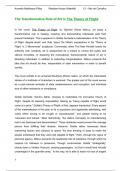Auerello Matthaeus Pillay Reddam House Waterfall 12 – Mrs de Carvalho
The Transformative Role of Art in The Theory of Flight:
In the novel, The Theory of Flight, by Siphiwe Gloria Ndlovu, art plays a
transformative role in healing, inspiring and transcending individuals past their
present hardships. This is apparent in Golide Gumede’s materialisation of his Theory
of Flight, despite doubt; and Vida ‘Jesus’ De Villiers’ expressions in his 'Theory of
Flight: in 3 Movements’ sculptures. Conversely, when The Man Himself exerts his
authority over creativity, art is weaponised as a means to censor the public and
silence minorities. In depicting the motivational, transcendental nature of art in
liberating individuals, in addition to extending marginalisation, Ndlovu presents the
idea that art should be free, independent of state intervention in order to benefit
society.
The novel unfolds in an unnamed Southern African nation, on which the interrelated
stories of a multitude of characters is explored. The greater part of the novel serves
as a post-colonial reminder of state misdemeanours and corruption; and individual
acts of either resistance or compliance.
Golide Gumede, Genie’s father, chooses to materialise his innovative Theory of
Flight, despite its seeming impossibility. Seeing as “being capable of flight would
come at a price,” Golide’s Theory of Flight, at first, appears impractical. Every aspect
of the materialisation of his plan to fly is expensive and apparently debilitating, with
“parts either having to be bought or manufactured,” and people having to be
“educated and trained.” Most restrictively, “the state’s monopoly on manufacturing
had to be destroyed and decentralised.” These obstacles would prevent the average
person from fulfilling their dreams. However, Golide rather harnesses these
restraining factors and chooses to spend “his time thinking of ways to make the
people understand that they were still capable of flight.” Here, through the vigour of
personal agency, Ndlovu presents the leadership trait of resilience, through which he
inspires his followers to persevere. Though controversial, Golide “strategically”
shoots down a Vickers Viscount, carrying passengers, “so that it would land virtually
undamaged in the guerrilla camp.” In this way, he is able to teach his race of angels
1




